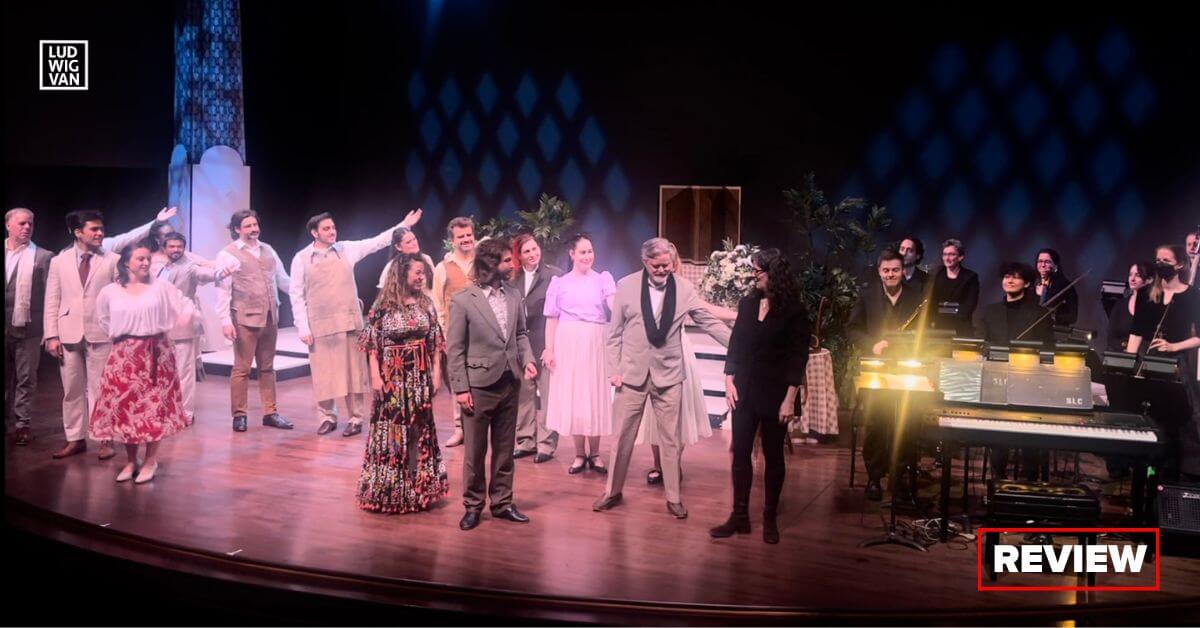
TOT Cabaret: Viva La Zarzuela: Tonatiuh Abrego, ten. (Juan Luis); Lucia Santilly, sop. (Raquel); Alexander Cappellazzo, ten. (Rodrigo); Dianna di Mauro, sop. (Raquel); Stuart Graham, bar. (don Diego)) / Toronto Operetta Theatre; Kate Carver, conductor; Guillermo Silva-Marín, stage director and English adaptation / St. Lawrence Centre for the Arts, May 5, 2024.
This Sunday, May 5, Toronto Operetta Theatre (TOT) ended its 2023-2024 season with a worthy performance of the Spanish zarzuela El huésped del sevillano / The Guest at the Inn.
The audience, which was barely a quarter full, applauded the various musical numbers and showed its connection, especially with the comic moments. The small orchestra of ten and especially the chorus of nine contributed to the brilliance of a low-budget performance specially designed for a non-Spanish-speaking audience.
Zarzuela is a type of operetta typical of Spain, which was especially successful between the second half of the 19th century and the first 30 years of the 20th century. The Guest at the Inn, composed by the prolific Jacinto Guerrero, premiered in 1926, and its immediate success has made Canción de la espada / The Sword Song one of the musical pieces most sung by Spanish tenors.
Never performed before in Canada, TOT’s version included a few minor variations to make this work accessible to Canadian audiences. First, the many spoken parts between the musical themes were in English. But, it must be underscored that when the singers and choir sang they not only did so with a very correct Spanish, but also with the Castilian accent of Toledo, where it is located.
In addition, the original work maintains part of the mystery of who is the guest at the inn, since it is a character at a table who is writing and not singing. It is Miguel de Cervantes, author of Don Quixote, who is writing a short novel before his best-known work. In Guillermo Silva-Marín‘s version, Cervantes (Sean Curran) addresses the audience from the beginning, involving them in his quest for inspiration to create a new short novel. In this way, the audience can more easily follow the text of a zarzuela designed for an audience more familiar with the author’s texts and Spanish culture.
The energy that this zarzuela transmits with a large orchestra is not the same as TOT offered with a reduced one located, moreover, to one side of the stage. But, it offered appropriate solutions, such as when the male chorus complements the lone percussionist with hand clapping. The tuning and coordination between orchestra, choir and singers, under the correct musical direction of Kate Carver, were good and allowed yours truly to enjoy a work that I have seen on numerous occasions in Spain.
As for the singers, Canadian tenor with Latin roots Tonatiuh Abrego played Juan Luis. The Sword Song is the first he must perform in the play. A pause over a note in the middle of it has allowed singers such as Plácido Domingo and Alfredo Kraus to show off the power of their voice and fiato. Abrego did not adorn his performance, but corectly delivered one of the most important and delicate moments of it, which is the legato before the refrain begins with “Brilla, Tizona.” Although he seemed somewhat lacking in momentum or energy, he grew into a mode of singing that, except for one note in the second duet with Raquel, was remarkably in tune and clearly articulated.
The role of Raquel was played by Lucia Santilly, who was making her debut with the TOT and who, from the outset, presented a firm, well-placed and powerful voice. She showed ease in reaching the highest and lowest notes, as well as in responding to the coloratura of the work. While the coordination with Abrego was magnificent, her solo La pena me hace llorar was outstanding.
As for the comic duo, Alexander Cappelazzo played the comic role of Rodrigo, Juan Luis’ servant, while Constancia was played by Diana di Mauro. Both showed a good comedic sense, a careful voice projection and an unmistakable articulation of the Spanish language. The Street Encounter was a great start for them, in which the chorus also led a very funny musical moment staging the contrast between the allegedly “ugly girls” and the “handsome guys.” They shone, and made the audience enjoy the most with If You were a Shepherdess, where the staging, the comic play with the lamb bleats or the histrionic interpretations showed the careful work behind the whole production. Portraying the play’s bad guy, Don Diego, baritone Stuart Graham sang equally well and firmly.
In short, it was a successful approach to a light, not too-pretentious comic play that entertained the audience for an hour and forty minutes, including intermission. In the end, they applauded the performers, who showed details of humour in the final salutations. For the few attendees, it was a good introduction to a piece in the folkloric music of one of the most successful forms of entertainment of Spanish culture.
By Antonio Peláez Barceló for LvT
Are you looking to promote an event? Have a news tip? Need to know the best events happening this weekend? Send us a note.
#LUDWIGVAN
Get the daily arts news straight to your inbox.
Sign up for the Ludwig Van Toronto e-Blast! — local classical music and opera news straight to your inbox
- CLASSICAL CHARTZ | Top Ten Classical Music Albums For The Week Of July 22 To 28 2024 - July 22, 2024
- GIVEAWAY | Enter To Win A BIGLAKE Arts Spectacular Beethoven Marathon Experience In Beautiful Prince Edward County - July 18, 2024
- CLASSICAL CHARTZ | The Top Ten Classical Music Albums For The Week Of July 8 To 14 2024 - July 8, 2024



